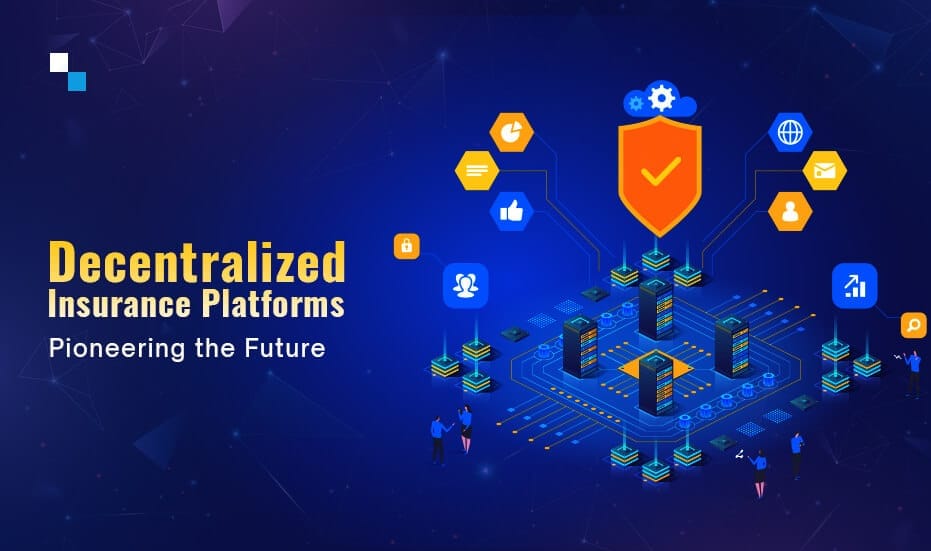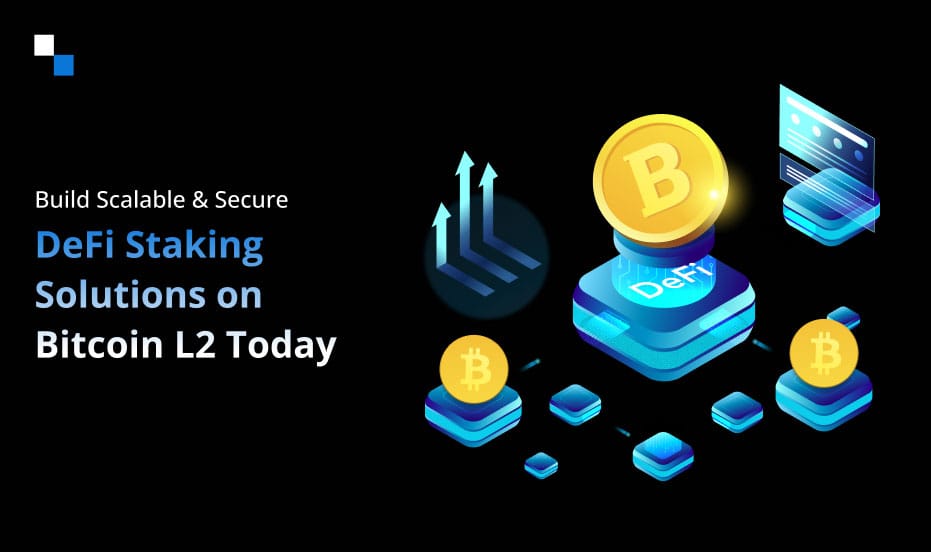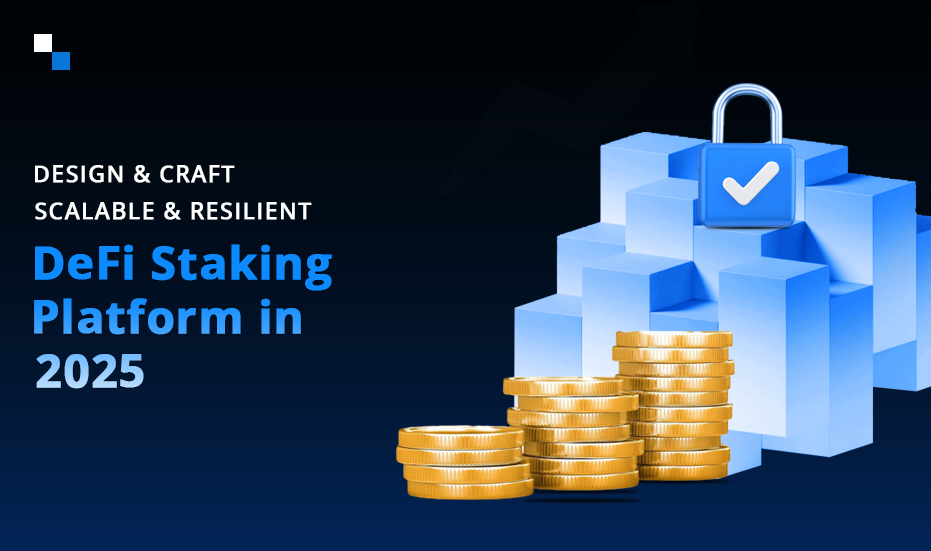Insurance has long been a significant aspect of modern society, as it provides individuals and businesses with a safety shield against unforeseen risks and losses. Traditionally, insurance has been centralized, with large corporations dominating the market. However, the advent of blockchain technology and the rise of decentralized finance (DeFi) have paved the way for a revolutionary change with decentralized insurance platform development.
Decentralized insurance has received significant attention as an alternative to traditional insurance models during the COVID-19 epidemic and has continued to grow. The immense popularity of blockchain-based solutions can be understood from the fact that the global decentralized insurance market was valued at $1.4 billion in 2022 and is expected to expand at a CAGR of 58.5% from 2023 to 2032, reaching $135.6 billion by 2032. Thousands of businesses have understood the worth of getting along with the right DeFi insurance platform development company and harnessing the benefits of decentralization in the insurance sector.
Understanding the Nitty Gritty of Decentralized Insurance
Decentralized insurance, also termed as DeFi insurance, operates on the blockchain, a distributed and immutable ledger. Unlike traditional insurance, in which an insurance company acts as a centralized authority and assesses risks, and pays out claims, decentralized insurance employs smart contracts and decentralized platforms to achieve a trustless and transparent insurance process.
Blockchain-based smart contracts are self-executing agreements with the terms of the policy directly written into code. These contracts are executed automatically when specific conditions are met successfully and ensure that claims are paid out without the need for manual intervention or approval from any centralized entity. Decentralized insurance platform development eliminates the probability of human bias, manipulation, or fraud.
Core Principles of Decentralized Insurance
The core principles of transparency, security, and efficiency form the backbone of decentralized insurance. These core principles set the foundation for how decentralized insurance platforms function and differentiate them from traditional insurance models.
Let’s explore each principle in detail:
-
Transparency
Transparency is a fundamental aspect of decentralized insurance. All interactions, transactions, and policy-related information are recorded on a public blockchain, which is accessible to all participants. It ensures that all parties involved have a clear view of the insurance policies, premiums, and claims data. Therefore, decentralized insurance platforms build trust among policyholders and insurers.
Decentralization reduces information asymmetry, which is a common issue in centralized insurance, where policyholders may not have full visibility into the insurer’s decision-making processes. Transparent operations foster a sense of accountability and enable users to verify the legitimacy and fairness of the insurance platform.
-
Security
Security is of utmost importance in any financial system, and decentralized insurance platforms are no exception. DeFi insurance platform development company leverages blockchain technology, which provides a robust security infrastructure for the insurance platform.
The decentralized nature of the blockchain ensures that data and transactions are distributed across a network of nodes, making it difficult for malicious-minded people to compromise the system. The use of cryptographic algorithms ensures that sensitive data remains encrypted and tamper-proof. Additionally, blockchain’s consensus mechanisms, like Proof-of-Work or Proof-of-Stake, add another layer of security and prevents fraudulent activities and unauthorized access. Decentralized insurance platforms aim to protect user data, policy details, and funds from potential breaches, hacks, or manipulation by implementing advanced security measures.
-
Efficiency
Decentralized insurance platform development strives to improve the efficiency of insurance processes. Smart contracts play a pivotal role in achieving this goal.
Smart contracts automate various aspects of insurance, including policy issuance, premium collection, and claims processing. When predefined conditions are met, such as a specified date or the occurrence of an insurable event, the smart contract automatically executes the corresponding action, be it the payment of a premium or the payout of a claim. This automation significantly reduces the need for manual intervention, paperwork, and administrative overhead, which are prevalent in traditional insurance systems. Choosing the best DeFi insurance platform development company makes it easier for insurance companies to offer faster and more streamlined services, and to ensure improved customer satisfaction.

Benefits of Decentralized Insurance Platform Development
Decentralized insurance offers a range of benefits that set it apart from traditional insurance models. As the insurance industry embraces decentralized finance (DeFi) and blockchain technology, these advantages become more apparent.
Let’s explore the key benefits of decentralized insurance:
-
Accessibility
Decentralized insurance is accessible to a broader range of individuals and businesses, which is one of the most significant advantages. On the other hand, traditional insurance models are limited to certain geographic regions or require extensive documentation, credit checks, or collateral, which makes it difficult for certain demographics to access coverage.
-
Inclusivity
Decentralized insurance platforms are designed to be more inclusive, providing coverage to underserved populations and those without access to traditional financial services. This inclusivity empowers more people to protect themselves against risks and unexpected events.
-
Lower Costs
Decentralized insurance eliminates intermediaries typically involved in traditional insurance models. As there is no need for brokers, underwriters, and other intermediaries, the overall operational costs are significantly reduced. As a result, policyholders can benefit from lower premiums, while insurers can offer more attractive returns.
-
Trust & Transparency
Blockchain technology, which underpins Decentralized insurance platform development, ensures transparency and trust. All transactions, policies, and claims are recorded on a public ledger that is accessible to all participants. This level of transparency builds trust among policyholders, as they can verify the terms of their policies and track claim processing in real-time.
-
Fast and Automated Claims Processing
Smart contracts automate the claims process in decentralized insurance platforms. The smart contract automatically triggers the claim payout when predefined conditions are met appropriately, such as the occurrence of a covered event. This automation eliminates the need for time-consuming claim investigations and reduces the chances of delayed or denied claims. Policyholders can experience faster claim settlements, leading to greater customer satisfaction.
-
Security & Fraud Prevention
Decentralized insurance platforms leverage the security features of blockchain technology. Data stored on the blockchain is immutable, meaning it cannot be altered or tampered with once recorded. This reduces the risk of fraud and manipulation, as policy details and claims data are securely stored and cannot be altered without consensus from the network.
-
Customizable Policies
A seasoned DeFi insurance platform development company can help bring more flexibility in policy design. The insurance provider can provide the detailed information about the desirable policies and the developers can code the smart contracts that infuses customizable policy parameters and enable users to get well tailored insurance coverage according to their specific needs. It empowers policyholders to design insurance plans that align with their risk profiles and budget constraints.
-
Peer-to-Peer Insurance
Decentralized insurance platforms can facilitate peer-to-peer (P2P) insurance models. P2P insurance pools together individuals who share similar risks and collectively provide coverage for each other. This community-based approach fosters a sense of trust and mutual support among participants.
-
Global Coverage
Traditional insurance often faces challenges in providing coverage across international borders due to varying regulations and complexities. Decentralized insurance platform development is powered by blockchain and can overcome these obstacles. It offers global coverage without the need for extensive cross-border infrastructure.
-
Reduced Counterparty Risk
In decentralized insurance, policyholders interact directly with the smart contract and not with a centralized insurance provider. This reduces counterparty risk, as policyholders do not need to worry about the financial stability of an insurer.
Use Cases of Decentralized Insurance
Decentralized insurance is driven by blockchain technology and smart contracts and has the potential to revolutionize various sectors by offering innovative and efficient insurance solutions.
Let’s explore some prominent use cases of decentralized insurance across different industries:
-
Peer-to-Peer (P2P) Insurance in Microinsurance
In regions with limited access to traditional insurance services, decentralized insurance can facilitate P2P insurance models. Microinsurance, which provides coverage for small-scale risks to low-income individuals, can be effectively managed through decentralized platforms. Communities can form P2P insurance pools, where members contribute premiums, and claims are automatically paid out through smart contracts when certain conditions are met. This use case empowers underserved populations with financial protection against risks like crop failure, health emergencies, or natural disasters.
-
Health Insurance
Decentralized insurance platforms can be used to create health insurance models that provide coverage to individuals based on personalized health data. Smart contracts can automate the claims process by verifying medical records and triggering payouts when specific medical conditions are diagnosed. This approach encourages healthier behaviors, as individuals can earn incentives for maintaining healthy lifestyles.
-
Property Insurance
Decentralized insurance platform development empoweres the real estate industry, as it streamlines property insurance processes. Property owners can insure their assets against damages, theft, or natural disasters using smart contracts. Claims can be verified through sensor data, weather reports, or IoT devices, reducing the need for manual inspections and expediting claim settlements.
-
Travel Insurance
Decentralized insurance platforms can offer on-demand travel insurance for short periods, tailored to the traveler’s specific needs. Policies can be activated and deactivated automatically based on travel dates, reducing costs and providing travelers with seamless coverage during their trips.
-
Agriculture Insurance
Farmers face significant risks due to unpredictable weather, pests, and crop diseases. Decentralized insurance can create customized insurance policies for farmers using real-time weather data and satellite imagery. Smart contracts can automatically trigger payouts when specific weather events or crop failures occur, ensuring quick and fair compensation.
-
Trade Insurance
In international trade, decentralized insurance can facilitate trade credit insurance. Exporters and importers can secure their transactions against non-payment or other trade-related risks. The use of smart contracts ensures automatic verification of trade conditions and streamlined claims processing.
-
Automobile Insurance
Automobile insurance can be reimagined through decentralized platforms. Usage-based insurance can be implemented, where premiums are based on actual driving behavior. Telematics data from connected cars can be used to determine risk profiles, leading to fairer pricing and incentivizing safe driving habits.
-
Flight Insurance
Decentralized insurance can be integrated into the airline industry to offer passengers flight delay or cancellation insurance. Smart contracts can monitor flight status in real-time and automatically trigger claim payouts when flights are significantly delayed or canceled.
-
Event Insurance
Event organizers can use decentralized insurance to protect against unforeseen cancellations, disruptions, or liability claims. Attendees can opt for event insurance during ticket purchases, and automatic claim processing ensures swift resolution in case of covered incidents.
Conclusion
Decentralized insurance represents a paradigm shift in the insurance industry, offering a more accessible, transparent, and efficient alternative to traditional insurance models. Despite certain challenges, like regulatory uncertainty, smart contract vulnerabilities, price volatility, and lack of traditional risk assessment data, decentralized insurance continues to gain momentum and attract interest from both users and investors. As the technology evolves and regulatory frameworks become clearer, decentralized insurance platforms will likely see increased adoption and improved functionality.
As the world embraces decentralized finance and blockchain, the potential for decentralized insurance platform development to reshape the insurance landscape and empower millions of people with financial protection is undeniably promising. Choosing the right DeFi insurance platform development company ensures that the ongoing security audits and the implementation of robust bug bounty programs are done essentially to address smart contract vulnerabilities. There can be no better choice than Antier that is among the top notch blockchain companies. Let us discuss your ideas and expectations and we will deliver a robust platform for your insurance company with the best features and functionalities.





